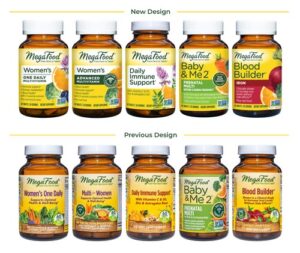Most parents can agree that they want the best for their children when it comes to their health. Parents want their kids to grow and flourish, both mentally and physically, in hopes that they are happy and healthy in all aspects of their developing bodies and minds. Giving them a nutritional boost, whether it be through whole foods or supplements, can be a topic every parent would like to delve into deeper. To fuel their growth and promote overall health, parents might be contemplating supplementation with a multivitamin, and we are here to help them make a more informed decision!
Do Children Really Need Multivitamins?
In an ideal world, kids would be getting all of the nutrients they need for their growing bodies and minds through their nutritionally balanced diets. Unfortunately, this is not always the case. While parents do their best to keep their kids healthy with a nutritionally dense diet, life gets busy with extracurricular activities, hectic schedules and constant multitasking. To make matters worse, getting kids to eat healthily can often be a job in itself.
As children are growing, so are their nutritional needs. The best case scenario would be feeding kids a quality nutrient dense diet, low in sugar and high in naturally occurring vitamins and minerals. Whole real foods are the best source of nutrients, however this isn’t always feasible. Eating minimally processed whole foods should lay the foundation of a child’s nutritional needs. It would be silly to think that one can just give their kid fast food and a multivitamin and think they’ve got all of their bases covered. A combination of whole foods and a good quality multivitamin can help ensure children are getting all the essential nutrients they need, helping to provide the best foundation for a healthy lifestyle.
Parents should try to encourage their kids to eat healthy snacks, such as raw unsalted nuts, turkey and cheese roll-ups, even fresh fruit and dark chocolate. However, parents should also understand that they are kids after all, and they are more than likely going to eat some not so healthy snacks. These snacks will likely be full of sugar and void of nutrients, so practicing balance is imperative when it comes to teaching children about eating healthily and living well. Multivitamin supplements should not act as a substitute for implementing healthy lifestyle principles, such as eating well and staying active, but it can certainly complement an already healthy lifestyle and supplement what might be lacking or missing from the diet.
Parents might consider adding in a multivitamin to a child’s health routine if they have a child who:
- Isn’t eating regularly well-balanced meals comprised of whole, fresh foods
- Is a picky eater and just isn’t getting enough variety of nutrients from their diet
- Has a chronic health condition, is taking medication, or has a constantly compromised immune system
- Is extremely active and involved in many physically demanding sports and activities
- Eats a lot of fast-food, processed food, or junk food high in sugar and also drinks a lot of soda or sugary drinks
- Has a restricted or specialized diet, such as being a vegetarian or a vegan
What Nutrients do Kids Need the Most?
If parents decide they want to give their kids an extra nutritional boost and opt to purchase a multivitamin, they should look for these nutrients to support overall immune health, energy production, and cognitive function.
Omega-3 fatty acids: These fatty acids include ALA, EPA and DHA and help to support heart and eye health, as well as healthy cognitive functioning and brain development. They are found naturally in oily and fatty fish, flaxseed, chia seeds, walnuts and hemp seeds. Fish oil, krill oil and cod liver oil can be great supplements to incorporate into a child’s supplement arsenal if they are a picky eater. Brands that come in a liquid form are helpful if the child isn’t keen on swallowing pills; many brands now have some super delicious flavors, such as mango and pineapple, which can be blended right into the child’s morning smoothie!
B-vitamins: As a group of eight different vitamins, B vitamins work together to support cardiovascular and nervous system health, energy levels, metabolism and mood support. B vitamins also help the body make energy from the foods we eat. They are found naturally in meat, poultry, fish, eggs, dairy as well as whole grains, pumpkin seeds, dates, tomatoes, peppers, bananas and berries. A good quality B-complex can be a great supplement for supporting energy levels, cognitive health and mood support. Ideally, try and look for the Methyl form of the B vitamins, as they are the bioactive forms and can be more easily assimilated in the body and cells.
Vitamin C: As an antioxidant and water soluble vitamin, vitamin C supports immune health and aids the body in iron absorption. Vitamin C may protect cells from damaging free radicals. While vitamin C is mostly known for its immune boosting properties, it is also critical for brain health and adrenal glands, in fact, we have about 50 times more vitamin C in our brain than in our bloodstream. You can get vitamin C from fruits and vegetables, including red and green peppers, tomatoes, strawberries, pineapple, kiwis, potatoes and broccoli. Food-based vitamin C, such as Camu Camu or acerola cherries, gives a little more bang for the buck nutrition wise. Camu Camu is a fruit found in the swamps of the Amazon rainforest that has 60 times as much vitamin C than an orange! Camu is rich not only in vitamin C, but also beta-carotene, lutein, zeaxanthin, iron and potassium.
Vitamin D: As a vital fat soluble vitamin, vitamin D is important for strong, healthy bones and immune function, yet 40-70 percent of the population is deficient in this vital vitamin! Vitamin D helps the body to absorb calcium, and can promote proper tooth and bone formation. It is found naturally in full-fat dairy products, fish, egg yolks, cheese and yogurt as well as mushrooms, kale and almonds. Parents should not forget about having children play in the sun, as it is a source of vitamin D as well! Vitamin D3, as opposed to vitamin D2, has been shown to not only stay in the bloodstream longer, but also raise low serum vitamin D levels better than D2. Offer vitamin D3 in a spray or liquid form (maybe with a nice orange flavor) for kids who are averse to swallowing pills. Vitamin D3 should be taken with a meal, as it is a fat-soluble vitamin and is better absorbed in the presence of fat, such as a spoonful of peanut butter!
Calcium: As an essential mineral, calcium plays a role in muscle function, nerve signaling and transmission, blood clotting and healthy bone structure. It can be found naturally in dark leafy greens, broccoli, spinach, beans, almonds and figs, as well as fish, yogurt and cheese. In order to properly absorb calcium there needs to be enough vitamin D and magnesium present in the bloodstream. Choosing a calcium supplement can get confusing, as there are quite a few forms, but some studies have found calcium citrate to be more easily absorbed.
Iron: Iron is an essential trace mineral required for the production of healthy red blood cells and is essential for a child’s growth and development, yet it is the most common nutritional deficiency worldwide. Iron is a component of hemoglobin and therefore essential for the transport of oxygen throughout the body. Iron is also involved in cellular energy production and is a component of important antioxidant enzymes. It can be found naturally in dark leafy greens, spinach, beans, cashews, peanuts, dark chocolate and prunes as well as beef, turkey, pork, mussels, clams and oysters. Excessive amounts of iron can lead to GI distress and even diarrhea, so opt for a whole-food-based iron and be sure there is some vitamin C present, as this can increase absorption. The current RDA for iron kids ages 9-13 is 8 mg per day.
How to Get a Child to Take a Multivitamin
Swallowing pills is never a ton of fun, especially if you are kid, so taking an alternative form of a multivitamin might be the best bet. Multivitamins come in many kid-friendly variations, such as liquid, gummies, and chewable tablets. Kids might be more inclined to take a multivitamin if it tastes like something they actually like. Be wary of offering supplements with added sugars, as some multis can start to appear to be just a piece of candy in disguise. Try to avoid artificial sweeteners and high fructose corn syrup. Instead look for a multivitamin that is made with a more natural sugar, such as fructose found in fruits and ideally has less then 1 g of sugar per serving. You don’t want the added sugar to negate the posed health benefits of the actual supplement.
Parents should try to make taking a multivitamin part of a child’s daily routine. Aim for the child to take it at the same time every day—maybe with their breakfast each morning, or have it waiting for them first thing when they come home from school with their afternoon snack.
Parents should also make the child understand the importance and benefits of nourishing their growing bodies so they don’t feel like it’s just one more thing the parents are telling them to do. Parents can explain the role food and nutrients play when it comes to growing big and strong, and developing creative and intelligent minds. Feed the child’s mind with nutrition and knowledge at the same time!
In Sum
Good nutrition starts with what is put at the end of the fork. If parents are looking to fill the gaps of some nutritional needs and want to give their kids an extra boost when it comes to health, then they might consider having their child take a multivitamin. While not required, a children’s multivitamin can potentially benefit a child’s health when used in conjunction with a nutritionally balanced diet and active lifestyle.
References:
https://www.ncbi.nlm.nih.gov/pmc/articles/PMC2083301/
https://www.ncbi.nlm.nih.gov/pmc/articles/PMC4109789/
 Brianna Diorio is a clinical nutritionist with an MS in human nutrition. She is also a holistic lifestyle coach and NASM CPT. Diorio advocates a holistic and naturopathic approach toward health and wellness, placing importance on proper digestive health, gluten-free living, herbal supplementation and using food as functional medicine as information for our cells. She is the director of training and education at Vitamer Laboratories in Irvine, CA.
Brianna Diorio is a clinical nutritionist with an MS in human nutrition. She is also a holistic lifestyle coach and NASM CPT. Diorio advocates a holistic and naturopathic approach toward health and wellness, placing importance on proper digestive health, gluten-free living, herbal supplementation and using food as functional medicine as information for our cells. She is the director of training and education at Vitamer Laboratories in Irvine, CA.












